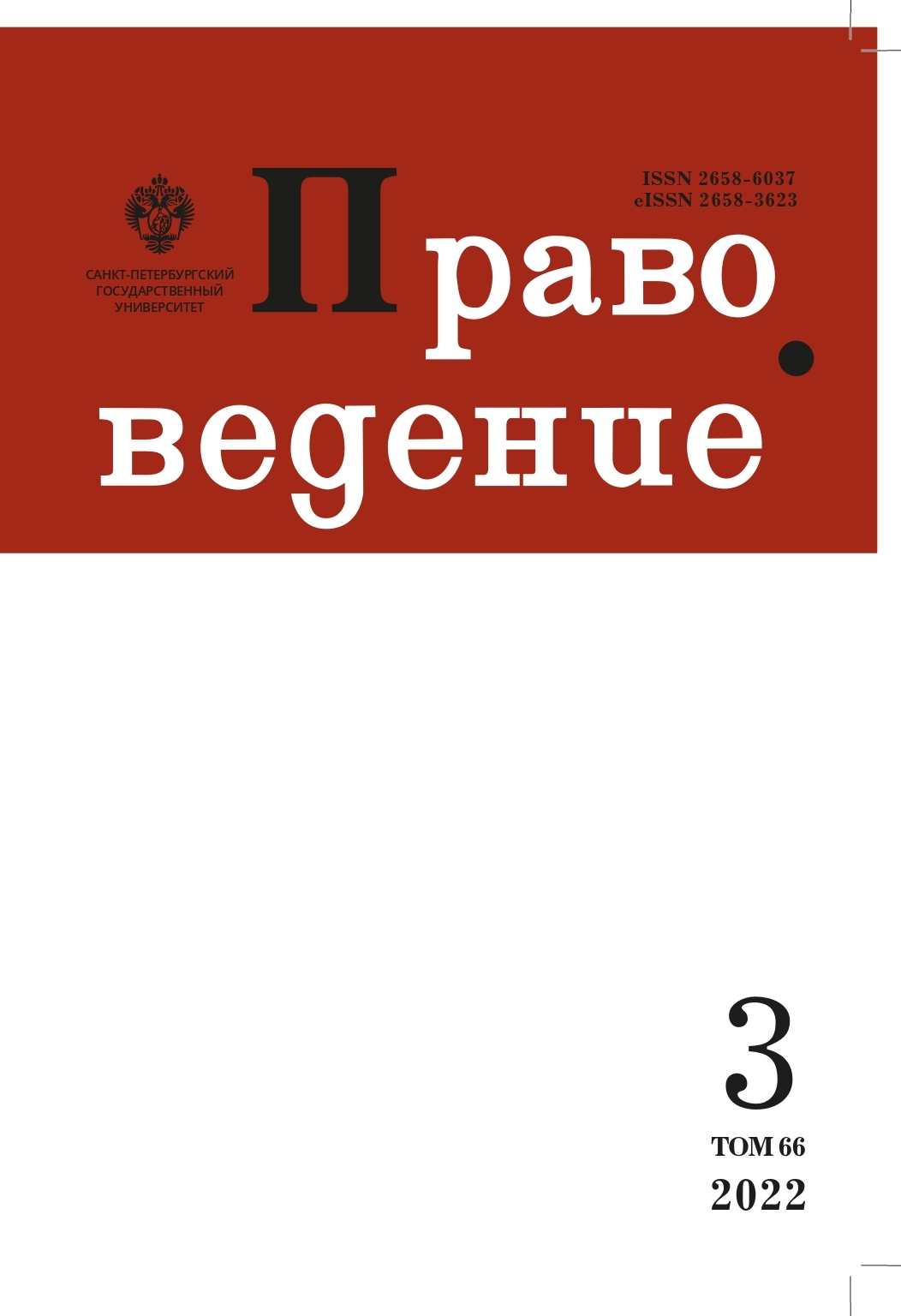A comparative legal analysis of the institutions of non-contractual liability in the two Koreas
DOI:
https://doi.org/10.21638/spbu25.2022.306Abstract
The article provides a comparative legal analysis of the tort law of the Republic of Korea and the Democratic People’s Republic of Korea. The existing difference between the legal institutions of the two Koreas is considered, taking into account the influence of foreign legislation, among which special attention is given to the norms of the Russian Soviet Federative Socialist Republic (RSFSR). The author of the article shows that the historical roots of legal norms and the specifics of the political and economic system played a decisive role in the formation and development of the diametrically opposite institutions of tort law in the two Koreas. For example, the Civil Code of the Democratic People’s Republic of Korea, in contrast to the Civil Code of the Republic of Korea, establishes the principle of presumption of fault, which is a consequence of the direct and inevitable impact of Soviet law on North Korean legislation. Considering that, in contrast to bourgeois pre-revolutionary Russia, where, as in most Western countries and the Republic of Korea, the principle of the presumption of innocence in tort obligations was recognized, a change in the approach to fault took place in Soviet Russia due to socialist ideological factors. It was these ideological principles that formed the basis of the legislation of the Democratic People’s Republic of Korea. Meanwhile the Civil Code of the Republic of Korea from the very beginning was based on completely different principles, as was the case in most Western countries. In addition to general tort, this article studies the norms of special torts, among which the emphasis is on the norms on liability for harm caused by minors and for harm caused by activities that create increased danger to others. It is these norms that best reveal the differences in the legal policy pursued by the legislators in South and North Korea. As is the case with general tort, different ideological principles that form the basis of legislation in the two Koreas led to a difference in the law of special torts. Although at present, the gap between South and North Korean tort institutions is not critical, it will become a serious problem in the medium to long term, as it will negatively affect the potential for unification of the two Koreas.
Keywords:
Tort liability, Republic of Korea, Democratic People’s Republic of Korea, Soviet law, principle of the presumption of fault, principle of the presumption of innocence
Downloads
References
Choi, Dalgon. 1987. Characteristics of the changes of North Korean civil law. North Korea 185: 28. Seoul, North Korea Research Institute. (In Korean)
Choi, Dalgon. 1994. The system and characteristics of North Korean civil law. The system and characteristics of North Korean law. Seoul, Sejong Research Institute. (In Korean)
Giesen, Ivo. 2010. The reversal of the burden of proof in the Principles of European tort law. A comparison with Dutch tort law and civil procedure rules. Utrecht Law Review 6 (1): 22. Utrecht, Igitur.
Gubaeva, Aza K. 2012. Some Current Trends of Development of the Tort Liability Institute (Comparative and Legal Aspect). Vestnik of Saint Petersburg University. Law 4: 22. (In Russian)
Karner, Ernst. 2009. The Function of the Burden of Proof in Tort Law // Koziol H., Steininger B. C. (eds). European Tort Law, 2008. Vienna; New York, De Gruyter.
Kim, Sangyong Y. 2001. Amendment works of the Korean civil code (Property Law). Rechtspolitisches Forum 3. Trier: Institut für Rechtspolitik an der Universität Trier. Available at: https://nbnresolving.org/urn:nbn:de:0168-ssoar-261023 (accessed: 01.09.2021). (In Korean)
Lee, Eunyoung Y. 2017. Parental Liability for the Torts of competent Minors — Focusing on the Classification of Torts for the Fair Apportionment of Liability. HUFS Law Review 41 (2): 237–239. Seoul, HUFS Law Research Institute. (In Korean)
Lee, Jewoo. 2014. The nature of guardian liability and the delictual and financial capacities of minors. Kyung Hee Law Journal 49 (3): 20. Seoul, Institute of Legal Studies, Kyunghee University. (In Korean)
Lee, Jewoo. 2013. A comparative analysis on the principle of fault in continental tort law: PhD Thesis in Law. St Petersburg, Saint Petersburg University Press. (In Russian)
Lee, Jewoo. 2014. Two Defining Features of Russian Tort Law: Their Rationale and Legal Effect. Review of Central and East European Law 39: 130. Leiden, Brill Nijhoff.
Lee, Jewoo. 2018. A Study on the Main Characteristics of North Korean Tort Law — an analysis of the influence of Russian law. Studies on North Korean Law 20: 132–133. Seoul, Korea Society of Unification & North Korean Law Studies. (In Korean)
Ministry of Justice (Republic of Korea). 2012. 2004 Draft bill of the Civil Code of the Ministry of Justice. The law of obligations and annex. Seoul, Minsokwon. (In Korean)
Ministry of Justice (Republic of Korea). 2014. Commentaries on North Korean civil law. Seoul, Ministry of Justice. (In Korean)
Moon, Joonyoung Y. 2016. The making of the Constitution and the Civil Code in Postliberation Korea. The spirit of Korean law: Korean legal history in context, ed. by M. Kim. Leiden; Boston, Brill.
Peretersky, Ivan S. 1984. The Digest of Justinian. Selected excerpts. Moscow, Nauka Publ. (In Russian)
Shershenevich, Gabriel F. 2001. A course on civil law. Tula, Autograph Publ. (In Russian)
Wilkinson III, James H. 2018. The presumption of civil innocence. Virginia Law Review 104 (4): 611–620. 2018. Charlottesville, University of Virginia School of Law.
Downloads
Published
How to Cite
Issue
Section
License
Articles of "Pravovedenie" are open access distributed under the terms of the License Agreement with Saint Petersburg State University, which permits to the authors unrestricted distribution and self-archiving free of charge.




